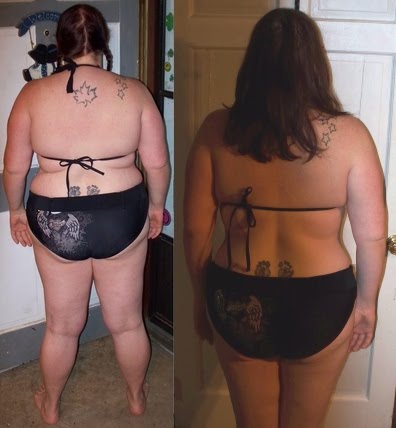Back fatttttt. eeek.

lowpro1983
Posts: 305 Member
I know that I need cardio - got that - but what are some good exercises to strengthen the muscles in your back? Seems that one of my problem areas (probably like most women) is the area right under where the bra is.....
any help is appreciated! thanks!
any help is appreciated! thanks!
0
Replies
-
strength exercises...0
-
nothing works as well and as fast as the good old.... PUSH UP!..... and your arms and chest will get a workout, too!.... add to that a little cardio and go for the BURPEES....0
-
I do weights 3 times per week at the gym and cardio on the off days. In one month there was a definite difference in my progress pics in the back-fat area.
In the meantime, check out the UNBELIEVABRA. It works wonders under your clothes!0 -
Exercise does little to promote fat loss. Being in a deficit will. Carb control is important to control insulin. (the fat storage hormone)
Fat loss is diet.0 -
Google these expercises online for how to perform them properly:
Shoulder press
Upright row
Back extension on a stability ball
Dumbbell rows
Superman
Russian twists - works abs and back
Wood chop
You can also google back exercises for others!
Plus 20 to 30 minutes of cardio 3 to 4 times a week.
These exercises will strengthen your muscles and make you more toned. But only if you burn off the layer of fat that's hiding them.0 -
pretty much thisExercise does little to promote fat loss. Being in a deficit will. Carb control is important to control insulin. (the fat storage hormone)
Fat loss is diet.0 -
Kettlebell workout...squat w (I do 10lb) kettleball in hands in front of your body...keep arms straight, shoulders down and back and knees bent swing the kettle ball upwards (controlled motions) and back down. (Do not put the thing directly above your head) I do this about 25 x including them in my circuits. Works great!
This really works your whole body so it has added benefits.0 -
Buy starting strength and change your life0
-
pretty much thisExercise does little to promote fat loss. Being in a deficit will. Carb control is important to control insulin. (the fat storage hormone)
Fat loss is diet.
Exercise promotes healthy muscles which are needed to aide in healthy weight loss.0 -
pretty much thisExercise does little to promote fat loss. Being in a deficit will. Carb control is important to control insulin. (the fat storage hormone)
Fat loss is diet.
Exercise promotes healthy muscles which are needed to aide in healthy weight loss.
Muscle is not very metabolically active. Building muscle in a deficit is very limited.0 -
How can you say the muscle isn't metabolically active? Show me a peer reviewed journal saying the muscle isn't metabolically active. How can people that do compound lifts that work more than one muscle at a time have less body fat on them then people that don't?0
-
i lost it when i reached my goal weight. dont have it anymore.0
-
keep in mind - he didn't say that they aren't metabolically active or that workouts do nothing - just not muchHow can you say the muscle isn't metabolically active? Show me a peer reviewed journal saying the muscle isn't metabolically active. How can people that do compound lifts that work more than one muscle at a time have less body fat on them then people that don't?0 -
keep in mind - he didn't say that they aren't metabolically active or that workouts do nothing - just not muchHow can you say the muscle isn't metabolically active? Show me a peer reviewed journal saying the muscle isn't metabolically active. How can people that do compound lifts that work more than one muscle at a time have less body fat on them then people that don't?
Correct. People with very low bodyfat simply lose the fat.
This is a crude analogy, but very emaciated and wasted people have very little fat, but also very little muscle.
There are methods to lose body-fat and keep muscle.
Google Intermittent Fasting and Ketogenic Diet. Combine those and very low fat body percentages are attainable.0 -
Strength train and eat right.0
-
I haven't really been focusing on it but I've been doing a lot of zumba. With all the hip movement and booty pumping I have actually seen a pretty significant change in that area. Yay!0
-
Keep dropping body fat and it will go away. Don't go down this path tricking yourself into thinking you might be able to spot reduce. You won't.0
-
keep in mind - he didn't say that they aren't metabolically active or that workouts do nothing - just not muchHow can you say the muscle isn't metabolically active? Show me a peer reviewed journal saying the muscle isn't metabolically active. How can people that do compound lifts that work more than one muscle at a time have less body fat on them then people that don't?
Correct. People with very low bodyfat simply lose the fat.
This is a crude analogy, but very emaciated and wasted people have very little fat, but also very little muscle.
There are methods to lose body-fat and keep muscle.
Google Intermittent Fasting and Ketogenic Diet. Combine those and very low fat body percentages are attainable.
Really? People with low body fat simply lose the fat?
* listen to taso. 0
0 -
Honestly, it really is just general fat loss. No matter how much muscle you build in your back, you won't be able to see it with fat in the way. Just keep doing what you're doing... The annoying part of weight loss is that you don't get to choose where you see improvements. But if you keep moving, you should get to a place where you're happier with the gestalt.0
-
WordKeep dropping body fat and it will go away. Don't go down this path tricking yourself into thinking you might be able to spot reduce. You won't.0 -
keep in mind - he didn't say that they aren't metabolically active or that workouts do nothing - just not muchHow can you say the muscle isn't metabolically active? Show me a peer reviewed journal saying the muscle isn't metabolically active. How can people that do compound lifts that work more than one muscle at a time have less body fat on them then people that don't?
Correct. People with very low bodyfat simply lose the fat.
This is a crude analogy, but very emaciated and wasted people have very little fat, but also very little muscle.
There are methods to lose body-fat and keep muscle.
Google Intermittent Fasting and Ketogenic Diet. Combine those and very low fat body percentages are attainable.
Really? People with low body fat simply lose the fat?
* listen to taso.
I didn't say they "simply" lose the fat. I said there are ways to do it and a great many do it all the time. It's no secret. It can be done without weight lifting with the right knowledge.0 -
Didn't OP say she wanted to strengthen those muscles? Why did it immediately turn into a "you can't spot reduce fat" discussion?
Or am *I* the one being dense and everyone else figured out what she *meant* to say was that she wanted to lose fat in that area?
Because my answer for strengthening the back muscles (and pretty much all of the other muscles) would be deadlifts, rows, and squats (in conjunction with OHP and bench).0 -
Didn't OP say she wanted to strengthen those muscles? Why did it immediately turn into a "you can't spot reduce fat" discussion?
Or am *I* the one being dense and everyone else figured out what she *meant* to say was that she wanted to lose fat in that area?
Because my answer for strengthening the back muscles (and pretty much all of the other muscles) would be deadlifts, rows, and squats (in conjunction with OHP and bench).
the thread title is "Back fatttttt. eeek."0 -
Genie bra. problem solved.0
-
Exercise does little to promote fat loss. Being in a deficit will. Carb control is important to control insulin. (the fat storage hormone)
Fat loss is diet.
Exercise and specifically strength training causes postive hormonal responses that aid in fat loss and help to maintain deficit. Also, insulin is a critical hormone for regulating blood sugar. It's is not for storing fat. How would you account for the fact that protein also spikes insulin. Some attached reading for your enjoyment.
http://weightology.net/weightologyweekly/?page_id=319
FTR, I am an advocate of being judicious with carbs for craving control and blood sugar stability.0 -
pretty much thisExercise does little to promote fat loss. Being in a deficit will. Carb control is important to control insulin. (the fat storage hormone)
Fat loss is diet.
Exercise promotes healthy muscles which are needed to aide in healthy weight loss.
Muscle is not very metabolically active. Building muscle in a deficit is very limited.
The aim generally is to preserve LBM as much as possible. Strength training is one of the things that will mitigate LBM loss while eating at a deficit. The actual act of exercising can create a deficit. Win/win imo.0 -
Chalean Johnsons "Chalean Extreme" and "Turbofire" really got my back fat BLASTED.. I know it's not COMPLETELY gone but you look small so I'm sure yours isn't as massive as mine once was lol.. But here's a look at what happened with those programs. I'm sure it's changed more in the last month but I don't have a picture of it yet.
 0
0 -
HIIT w/kettlebells.
I may have pictures on my profile.
From my blog
start sept 2009 second photo dec 2009
I need to have current photos done.0 -
Looking at it from a different perspective.. do you have the right size bra??
I still have some after 84lbs lost, so hopefully with some more weight loss it will improve, but once I got new bras it helped ALOT... so maybe both things to consider (weight loss and bras)0 -
Exercise does little to promote fat loss. Being in a deficit will. Carb control is important to control insulin. (the fat storage hormone)
Fat loss is diet.
Exercise and specifically strength training causes postive hormonal responses that aid in fat loss and help to maintain deficit. Also, insulin is a critical hormone for regulating blood sugar. It's is not for storing fat. How would you account for the fact that protein also spikes insulin. Some attached reading for your enjoyment.
http://weightology.net/weightologyweekly/?page_id=319
FTR, I am an advocate of being judicious with carbs for craving control and blood sugar stability.
I did not say anything about protein. Are you assuming I advocate a high protein diet? I don't.
I eat a 75% fat, 20% protein, 5% carb diet. Packing in additional carbs only forces the issue with insulin. A high protein does does stimulate an insulin response.
Insulin does take that excess glucose that can not be received by organs and muscle and stores it as fat. This is how it keeps the glucose from reaching toxic levels.
We need between 0.1 to 0.3 grams of protein per lean pound of body fat to maintain muscle.
The article you listed is for a high protein diet. It's relevant based on your assumptions, but not relevant based on the advice I gave.
I also fast daily to keep my insulin at minimal levels to lose fat.0
This discussion has been closed.
Categories
- All Categories
- 1.4M Health, Wellness and Goals
- 398.5K Introduce Yourself
- 44.7K Getting Started
- 261K Health and Weight Loss
- 176.4K Food and Nutrition
- 47.7K Recipes
- 233K Fitness and Exercise
- 462 Sleep, Mindfulness and Overall Wellness
- 6.5K Goal: Maintaining Weight
- 8.7K Goal: Gaining Weight and Body Building
- 153.5K Motivation and Support
- 8.4K Challenges
- 1.4K Debate Club
- 96.5K Chit-Chat
- 2.6K Fun and Games
- 4.8K MyFitnessPal Information
- 18 News and Announcements
- 21 MyFitnessPal Academy
- 1.5K Feature Suggestions and Ideas
- 3.2K MyFitnessPal Tech Support Questions

















